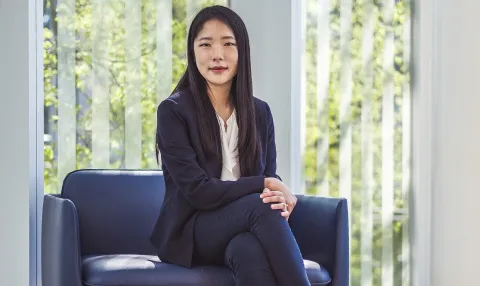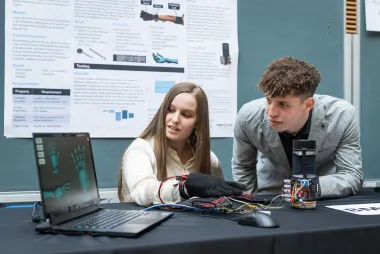“Meeting and interacting with participants [with Parkinson’s disease] have been some of the greatest moments I’ve had, as they have elevated my motivation and desire to identify promising treatments for them.”

Soojin Lee
- Degree:
- Doctor of Philosophy
- Grad year: 2019
- Program:
- Campus: Vancouver
I received my Master of Applied Science in Chemical and Biological Engineering from UBC in 2010 and worked for Samsung Engineering for about two years thereafter. Since 2014, I’ve been working towards completing my PhD in biomedical engineering; my thesis project is on developing a non-invasive brain stimulation technique as a potential therapeutic intervention for people with Parkinson’s disease. Individuals with Parkinson’s disease experience debilitating motor symptoms, which are associated with abnormal brain activities. Current treatments include medication and invasive surgical implantation of electrodes into deep regions of the brain that deliver impulses, and there has been a growing interest to identify safer non-invasive brain stimulation treatments for those living with Parkinson’s disease. Central to my dissertation research is a treatment where we deliver weak electrical currents non-invasively to the balance organ in the inner ear to induce changes in brain activities. With much excitement, we found particular electrical stimuli had improved motor performance in people with Parkinson’s disease.
Why did you choose engineering?
Ever since I was in middle school, I’ve loved math and science much more than other subjects — I found there were clear rules and the path I would take to find the answers could be derived from those rules. I was particularly interested in chemistry in high school, and when it came time to choose my university major, I selected chemical engineering over chemistry. I was somewhat influenced by my high school teacher who advised me that chemical engineering would be more “practical.” I wasn’t sure exactly what she meant until I completed a couple years of study at university, when I became more fascinated with the ways chemical engineers devise and develop techniques and tools that can make the world a better place. For my master’s thesis, for instance, I developed a process to produce biodiesel (renewable fuel) from waste cooking oils. As part of my PhD research project, I’ve been able to continue being innovative by devising a method to non-invasively modulate brain waves to treat motor symptoms of patients with neurological disorders.
What has made your time at UBC the most memorable?
The time I’ve had to work with colleagues and meet new contacts as part of a great research environment. I have had opportunities to work with various research groups in medicine, electrical engineering, physics and computer science. These opportunities provided me with unique experiences to learn how different approaches can be taken to tackle a problem and how critical and necessary collaborative and interdisciplinary work is when we attempt to solve important issues in the medical field. I also love the multicultural environment at UBC. I met people from many different cultures and made some good friends. My perspectives on life and about the world have broadened, and these relationships have taught me many interesting things that I would have not known otherwise — and that includes learning how to say ‘good morning’ in Italian and that the Indian words for ‘mom’ and ‘dad’ are the same as those in Korean!
What have you learned in engineering that is most valuable?
My current major is biomedical engineering, but interestingly, my experience in engineering began with chemical engineering when it was my major for my undergraduate and graduate programs. I also worked about two years for a chemical engineering company. Although the work was great and I had the opportunities to apply what I had learned in school towards actual engineering projects, I wanted to do work that was more practical to our daily lives. This led me pursue a PhD in biomedical engineering, with a focus on neuroscience. By studying two different engineering majors, I have learned that there is common ground between engineering fields no matter the research subject (e.g., cells, chemical compounds, engines and so on).
One common ground is in-depth reviews of current knowledge. For the majority of cases, we want to find new ways to solve problems we face using existing knowledge, evidence and techniques. For example, if we want to improve detection rates of certain cancers or increase the accuracy of language translations produced by artificial intelligence, conducting in-depth literature reviews, becoming acquainted with what research has taken place and where the gaps are, and utilizing the information as much as possible at the beginning of your research project will not only save you a significant amount of time, but is more likely to lead to successful outcomes with a minimum risk of hitting a pitfall.
The second common ground between engineering fields is the necessary communication that takes place. Often, solutions to problems are not bounded by your own field. You may need to communicate with people in other disciplines with different areas of expertise. Again, don’t hesitate to reach out to professors, graduate students and even the scholars of the research articles you’re reading, to discuss your ideas and what support you might need. Many of these researchers are supportive and willing to give you their suggestions — just ask!
The third common ground I’ve observed is the strong math and stats background engineers have, which is very important to have when entering the STEM field as most of the content you will be working with has significant math and stats components. In my case, transitioning from chemical engineering (master’s) to biomedical engineering (PhD) was not easy, and I needed to learn new things from scratch, but it helps if you enjoy that process, which I did. The only subjects that I already had sufficient knowledge in and could utilize were math and stats. If you are thinking of an engineering career but unsure which engineering field you’d like to choose, building a strong foundation of knowledge in these two subjects will increase your chance for success no matter which engineering fields you are in!
What advice would you give a student considering a graduate degree in engineering?
The advice I would provide students is to explore as many research fields as possible by visiting websites of different research groups. Even within the same department and lab, there are a variety of research topics that they may not be aware of and can spark an interest. Though they may be reluctant to contact professors, whether it’s being timid or not wanting to take up their time, students should gather as much information as they can. And if there’s one theme that cuts across all disciplines, it’s that professors like talking about their research; so, don’t hesitate to contact professors or graduate students if you would like to know more about specific topics. If you are certain that you’ve found a research area that strongly motivates you, congratulations, you’ve got one of the most important factors needed to do a great job in a graduate school. The next step is to find ways to maintain that motivation.
Where do you find your inspiration?
My inspiration has come through two major sources. The first is through interactions with people with Parkinson’s disease. A significant portion of my research time is spent in front of a computer analysing brain imaging data, and looking at numbers and programming codes. I vividly remember how I felt when meeting participants with Parkinson’s disease who generously gave their time to volunteer in my research experiment. Meeting and interacting with participants have been some of the greatest moments I’ve had, as they have elevated my motivation and desire to identify promising treatments for them. The second source of my inspiration has come through my excellent and forward-thinking professors. I have been fortunate to be surrounded by, and learn from, top minds in the field. In particular, my supervisors have greatly contributed to my academic career and for me personally, they’ve impacted me by demonstrating the rigorous work and high levels of dedication that is needed to become great researchers and mentors. The inspiration and motivation I draw from these sources has given me the confidence and skills to find my own pathway to being a great researcher and mentor who can inspire others.



